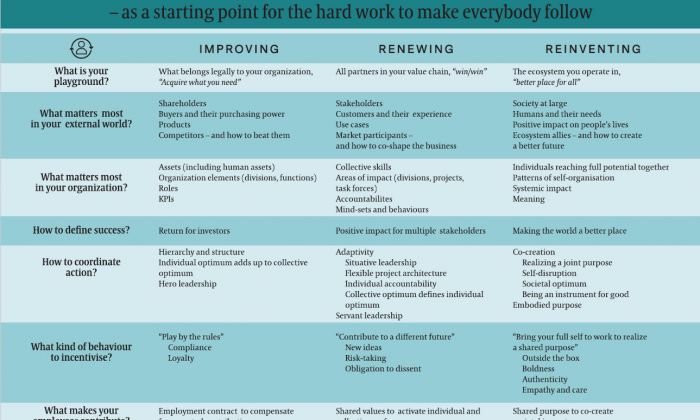The idea: Some of the greatest challenges companies face today have already been addressed effectively within the co-op/mutual model.* From creating values and purpose-driven cultures, to attracting new talent who prioritize authentic leadership, to juggling multiple, diverse stakeholders, co-ops have provided a roadmap for other organizations.
Because they are operating in a world of ever-increasing complexity, today’s leaders cannot rely on what they “know” or what worked in the past. The most successful CEOs are embracing a mindset of ongoing growth and adaption–they are far more inclined to dismantle old, limiting habits and push ahead with agility and determination. These leaders tend to be more collaborative than their predecessors, capable of both delegating and working collectively, to drive strategy as well as fuelling growth through innovation. In short, much has changed over the past two decades and changes will continue: “The era of the hero CEO is over,” as Edilson Camara, Egon Zehnder’s CEO, recently put it. Having worked alongside many co-ops and mutuals over the years and after interviewing co-operative and mutual leaders around the world for this article, we believe that co-ops are uniquely positioned to lead by example. As one co-op executive recently shared with us: “The winds of change have been blowing for a while in co-ops.”
“It’s not about individual visibility or one leader’s voice.”
Many people would be surprised to hear that 12 percent of people globally are members of the world’s 3 million+ co-ops. According to the ACI World Cooperative Monitor 2019, the top 300 co-ops and mutuals generate more than USD 2 trillion in revenues, comparable to the 8th largest economy globally. Viewed as value-centered and purposedriven, focused on the long term and creating prosperity for their members, co-ops offer an approach rooted in assuring equity, quality, and long-term sustainability while actively competing in the modern world.
By design, co-ops and mutuals have always been representative of a large pool of stakeholders and organized around a shared purpose and common values, making collaboration, engagement, and community intrinsic to their model. Moreover, great co-op leadership has always had a sense of service. “As leaders, we have a duty to serve our members and communities…the co-op is ‘bigger’ than us,” explains Guy Cormier, CEO of Desjardins Group in Canada.
At the same time, preserving and strengthening the vision and responsibility, while effectively keeping up with industry and market change, will be a critical challenge for co-ops moving forward. As they move ahead on this path, co-op and mutual leaders can provide compelling examples for their executive counterparts of other business models.
“The new generation is attracted by our model; they like our trust and empowerment principles.”
The Edelman Trust Barometer and other prominent global surveys have shown that employees want to work with business leaders they can trust and relate to, and who support the issues they care about. In particular, Millennial workers actively seek more authentic, representative leaders—people who are committed to their needs and values. co-op and mutual leaders fit this bill, having long carried their company mission and purpose; they are expected to be the standard bearers of the organization’s culture and values.
In addition, co-op leaders have historically been highly collaborative, more willing to work alongside their members and able to share the reins of leadership than the more commanding, stand-alone figures at the top of hierarchically structured businesses. While traditional businesses often gauge growth in terms of market share, revenue growth, or profitability metrics, co-ops and mutual look at the impact of growth on the organization’s purpose first. They are less focused on the next quarter, and more attuned to the next generation of their members. “For co-ops, our driving purpose is to serve our members and clients while enriching our communities economically and socially,” Cormier says. “People want purposeful businesses that can drive socio-economic development and the co-operative model does that.”
All told, employees today want more engaged leadership which comes naturally to the co-op CEO who must be adept at managing a wide array of relationships. As one co-op leader notes: “I need to be able to talk to my owners who are farmers on their farm as well as to senior bank executives in their boardrooms.” Whereas corporate leaders are currently learning how to lead more collectively, those in co-ops have been fine-tuning the craft and benefits of relationship-building since the early days of their careers. As Gaetan Desroches, CEO of Sollio Cooperative Group, explains, “A great co-op leader must be recognized and respected by his/her peers” which is why, he continued, “we take time to build internal consensus. This is our way to secure engagement and effective decision making.” Cormier concurs: “Co-operatives are democratic in nature, so a big part of my job is to explain and listen to all our stakeholders,” he says. “And in a time when we are rebuilding and reimagining our economy, listening to our members, clients and employees is crucial to our long-term success.”
Still, while co-ops are ahead in meeting many of the demands of leading in a changing world, they face their own challenges.
“The challenge is to accelerate our decision-making and agility in a faster world while remaining true to our identity.”
The art of co-op and mutual leadership is to foster agreement across the large constituent body. But this takes time, sometimes more than the market will allow. As one CEO put it, “Driving change in a world of compromise is a huge challenge.” Effectively balancing values and purpose while delivering a performance culture is difficult for all organizations, and co-ops are no exception. Leaders can be restricted by their organization’s structure, since decisions are protracted over a large representative body which must be convinced of the need for change in the first place. “Counter-power is hard to exercise, given the governance,” a European agriculture co-op CEO explains.
这份工作还可以加剧了div的缺乏ersity among board directors. Often, the board is almost exclusively composed of elected members, which makes creating diversity of thoughts and backgrounds challenging. As one former CHRO of a large co-op recalls, leaders often face pushback or even “a closed mindset” because co-op boards and their constituents can be “a little uncomfortable with what they don’t know” and tend to think and act in the same ways. More and more, we see leading co-ops taking the difficult step to update their governance model to balance agile decision making, ensure the right skillsets are in the boardroom, and maintain their heritage and co-op values – all at the same time.
Against that backdrop, co-ops have a clear opportunity to rethink how they attract, integrate, and uniquely develop the future leaders of their organizations.
To broaden their strategic outlook, many co-ops have shared they are recruiting more external talent to bring in diverse and new perspectives. However, external hires are often asked to observe and learn for up to a full year because, as one leader explains, an outside recruit must “adapt to” and “be adopted” by the community. Again, knowledge of and adherence to the co-op model and culture is essential. The best future co-op leadership teams will likely mix seasoned, carefully developed internal talent and acculturated external talent jointly negotiating organizational goals.
Toward an “empowered human model” of leadership – what’s next for co-ops and mutuals?”
Moving forward, co-ops will need leaders who can balance the structure and values of the model with the ability to drive meaningful change. “It will take a brave or courageous CEO to be able to think strategically and lead a homogenous group,” a former co-op leader elaborates. They will need to strategically challenge the status quo, craft a compelling vision for the future and drive innovation, all while respecting the values and history of the organization.
The crux of his job as CEO, Desroches says, “is taking the necessary time upfront to secure collective buy-in with members and all employees.” This requires a leader with a human touch. A co-op or mutual leader needs to like people and have a high level of empathy for others. Then he or she must be able to translate these skills into influence “It’s a leadership posture,” Cormier explains, a mindset that must permeate all levels of the organization. “The vision may be non-negotiable,” Cormier offers, “but the journey can always be discussed.”
As is true in the public sector, there is no room in this equation for large egos or “imperial CEOs.” Leaders must cultivate humility to gain the followership needed to drive change across the large collective. “Decisions cannot be made top down in co-ops,” Desroches points out. “Pushing decisions top down might seem to work in the short term but will not translate into long lasting change and impact in our model.” Leaders in cooperative and mutual models know they must continue to find new and better ways to mobilize decision-making across the co-op toward united, accelerated ends. co-op leaders must not only commit to their fellow citizenry but also help them see and embrace what the
co-op could aspire to be.
More and more we see co-ops and mutuals re-think how they assess and develop their future leaders, crafting new learning journeys and offering tailored leadership development programs in line with their future vision and their culture.
“Co-ops are more relevant than ever.”
The experience of Pascal Demurger, CEO of Mutuelle d’Assurance des Instituteurs de France (MAIF), demonstrates the current evolution among co-op leadership. Demurger came into the role 10 years ago, and halfway in dramatically changed his leadership philosophy. When he started, he adhered to a “command and control” style of leadership, but he realized that the co-op wasn’t responding to a detached, directive approach. He gradually shifted to what he calls an “empowered human model,” linking augmented human engagement to increased productivity. Three elements are at the core of his new leadership approach: providing a sense of direction, building trust, and being authentic. Changing the culture has taken substantial effort, Demurger admits. But the results are abundantly clear; today, “human or ethical decisions are feeding performance.”
Co-ops and mutuals are standing out in a world that is asking for businesses to connect their company goals to the larger purposes of multiple stakeholders, over a profit-first stance. As a result, they are increasingly attractive to the best and the brightest minds of the future—a generation deeply motivated to enable more sustainability and humanity in the world’s economies. The emerging generation of co-op leaders has a great opportunity to accelerate their organizational response and commitment to change under an inclusive model of great global leadership serving the many over the few.
*Throughout this article co-ops and mutuals will be used interchangeably.















